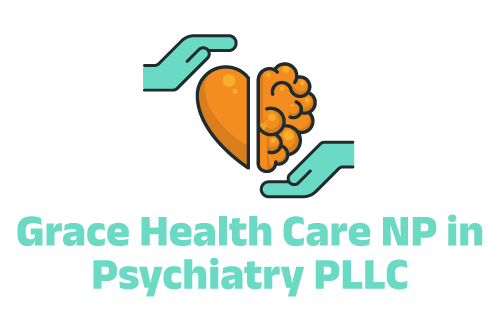Is Anxiety a Neurological Disorder? Many people around the globe deal with anxiety. It might be a brief moment of stress or a constant, powerful fear. Anxiety’s roots lie deeper than many realize. Understanding its neurological basis unlocks new coping strategies. This insight reshapes our approach to managing anxiety effectively.
This blog will explore if anxiety is a neurological disorder. It will also touch on how anxiety relates to nerve issues. Lastly, it will look at the effect anxiety has on our brains and nervous systems.
Grace Healthcare is ready to assist with your anxiety and its brain impacts. We offer custom treatments and expert care to help you regain your power. Contact us today.
What is Anxiety?
Let’s understand whether anxiety is a neurological disorder. Firstly, we must grasp what anxiety truly is. It’s a typical stress response. It could show up as discomfort, worry, or fear, notably in uncertain situations. Anxiety is not rare. But, it can become a problem if it lasts too long. It can turn intense and disrupt daily life.
Often, Anxiety and fears stir up. We call these anxiety disorders. They shape up differently such as GAD, panic disorder, or social anxiety. These problems can cause huge bumps in day-to-day living. Navigating social environments, work issues, or personal zones turns into a tough task.
Is Anxiety a Neurological Disorder?
We’re looking into a key query: Is anxiety a neurological disorder? Such conditions target the brain, spine, and the nerves linking them. This group encompasses illnesses like Parkinson’s disease, multiple sclerosis, epilepsy, and others that directly impact the nervous system.
Is anxiety disorder a neurological disorder? It’s complicated! Anxiety mainly impacts our feelings and our minds, but it’s also linked to our nervous system. Our brain acts up when stressed and prompts a defense mechanism in our body. This mechanism, the fight or flight response, is controlled by the autonomic nervous system a vital part of how our neurological functions work.
Sometimes, anxiety is seen as a brain disorder because it changes brain operations. Serotonin and dopamine, brain neurotransmitters, greatly affect how we feel. If these neurotransmitters are not balanced, anxiety and other mood problems could surface. So, anxiety is often called a mental health problem. But, it has neurological aspects, too.
How Does Anxiety Affect the Nervous System?
Anxiety and nerve problems have a solid link. Anxiety can kick off various body quirks, a lot of them tied to your nervous system. When you’re anxious, your body ramps up. Your autonomic nervous system handles this. It controls your heart rhythm, digestion, and breathing.
Can anxiety cause neurological problems? Indeed, chronic anxiety can hit the nervous system long term. Long-term fear can change the brain, especially the amygdala. It’s key for processing emotions. As we move ahead, such changes may harm our stress response. They may cause serious neurological issues.
Can anxiety cause nerve pain? There’s a notable link between anxiety and physical signs, nerve pain included. Anxiety can cause muscles to tighten up, which might result in pain in different body parts. At times, this pain feels like nerve pain. It makes people question if their anxiety is causing a nerve issue. The pain is real. It’s usually from muscle tightening, not nerve injury.
The Role of a Neurologist in Managing Anxiety
Can a neurologist help with anxiety, Thinking about the neurological factors? Doctors called neurologists, who help with nervous system hiccups, sure can assist. Usually, anxiety is handled by psychologists or psychiatrists. But, if there are clear neurological symptoms, a neurologist can treat the anxiety.
Let’s say someone often has headaches or seizures. Sometimes, they have strange neurological symptoms. Alongside this, they feel anxious a lot. Perhaps they’ll visit a neurologist. This specialist can determine if their symptoms are due to a brain issue or simply stress. Often, when the neurological problem is resolved, the stress improves too.
Anxiety and Depression
Think about this: How do anxiety, depression, and neurological health connect? Is anxiety and depression a neurological disorder? People often say depression is a mental issue. But, it is tied to the brain’s nerves. Depression tweaks how our brains work. It messes with our brain’s neurotransmitters. This causes lasting sadness, apathy, and even physical pain.
Anxiety and depression often strike together, hammering the mind and nerves. This dual assault overwhelms. One reels from the combined impact on the brain and body. These two conditions can sort of play off each other. This creates a cycle. It’s a hard one to break because anxiety can make depression worse and vice versa.
Anxiety and the Nervous System
We need to delve deeper into understanding if anxiety is a neurological disorder. Let’s observe how anxiety impacts our nervous system. Typical neurological signs of anxiety are:
-
Dizziness or lightheadedness
Anxiety can trigger rapid breathing, depleting blood CO2. This imbalance often leads to dizziness, a common symptom of heightened stress.
-
Tingling or numbness
Panic or prolonged muscle tension often causes this in the hands and feet.
-
Headaches
If you’re anxious, you might have muscle tension and stress that cause tension headaches.
-
Difficulty concentrating
When your mind is full of worries, it’s tough to concentrate.
These signs show the link between stress and our bodies’ nervous system. They’re not always a sign of neurological disorder. Rather, they show how anxiety can impact the body, mimicking neurological issues.
Managing Anxiety – Treatment Options
Deciphering if anxiety is a neurological disorder requires examining its treatment. This usually involves a mix of counseling, drugs, and changes in daily routines.
- Therapy
Cognitive-behavioral therapy, known as CBT, is often applied to anxiety. It aids people in recognizing and shifting harmful thought processes that amplify anxiety.
-
Medication
Certain medicines such as selective serotonin reuptake inhibitors, or SSRIs, are frequently recommended to stabilize chemical signals in the brain, thus lessening anxiety indicators.
-
Lifestyle Changes
Consistent physical activity, a nutritious diet, and relaxation methods like meditation can further aid in controlling anxiety.
If anxiety causes severe neurological symptoms, a brain doctor may join the care team. This multifaceted method guarantees that they consider all parts of the unease, even possible neurological issues.
Conclusion
So, is anxiety a neurological disorder? That’s tricky. Anxiety is seen as a mental health issue. But it is also linked to the nervous system. It affects the brain and nervous system. It can cause or worsen neurological issues. It’s key to grasp the link between anxiety and the nervous system for proper healing and control.
Having anxiety is tough. But remember; help is always there. You might talk to a psychologist or maybe a psychiatrist, even a neurologist. Why? To understand what causes your anxiety. This way, we can find better ways to treat it. When we tackle anxiety’s mind and body aspects, we can feel better. We can gain back control of our life.
Wrapping up, anxiety might not be a neurological disorder. Still, it impacts the nervous system. So, we need to look after mental and neurological health with caution.
FAQs
Q. Is anxiety a neurological disorder?
Anxiety has neurological components. But, it is mainly a mental health disorder.
Q. Can anxiety cause nerve problems?
Indeed, anxiety might trigger symptoms linked to nerves. It could result in a prickling feeling in the arms and legs, a sense of numbness, or stiff muscles. These body reactions often mirror how it deals with anxiety and stress.
Q. Can anxiety cause neurological problems?
Chronic anxiety can harm brain function. It may cause neurological issues.







No comment